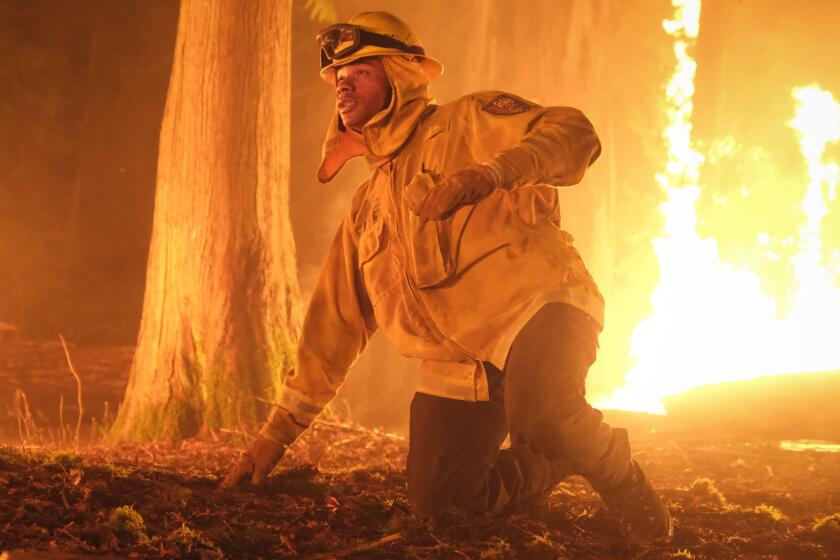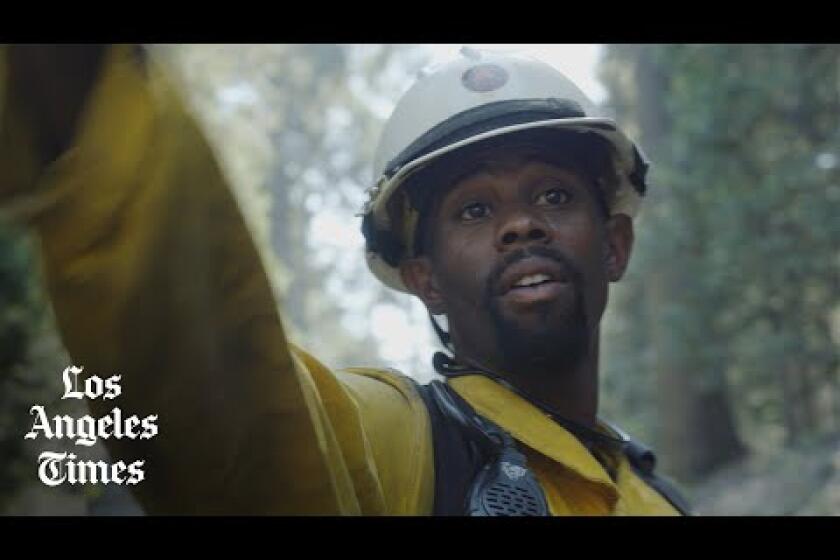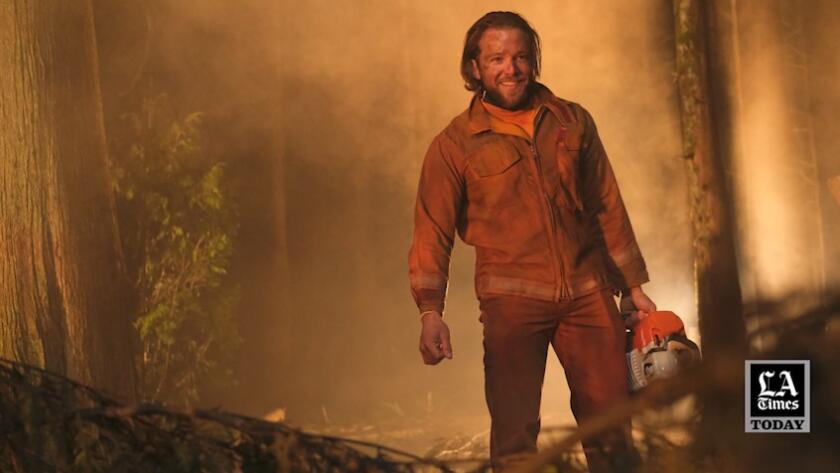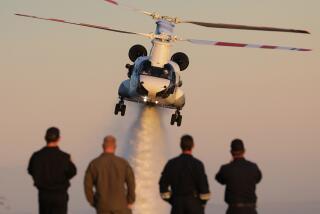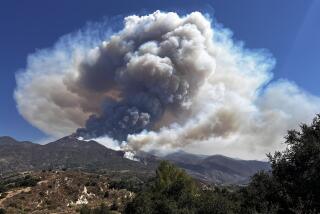‘Fire Country,’ the new TV show about Cal Fire, is a hit. Just not with Cal Fire
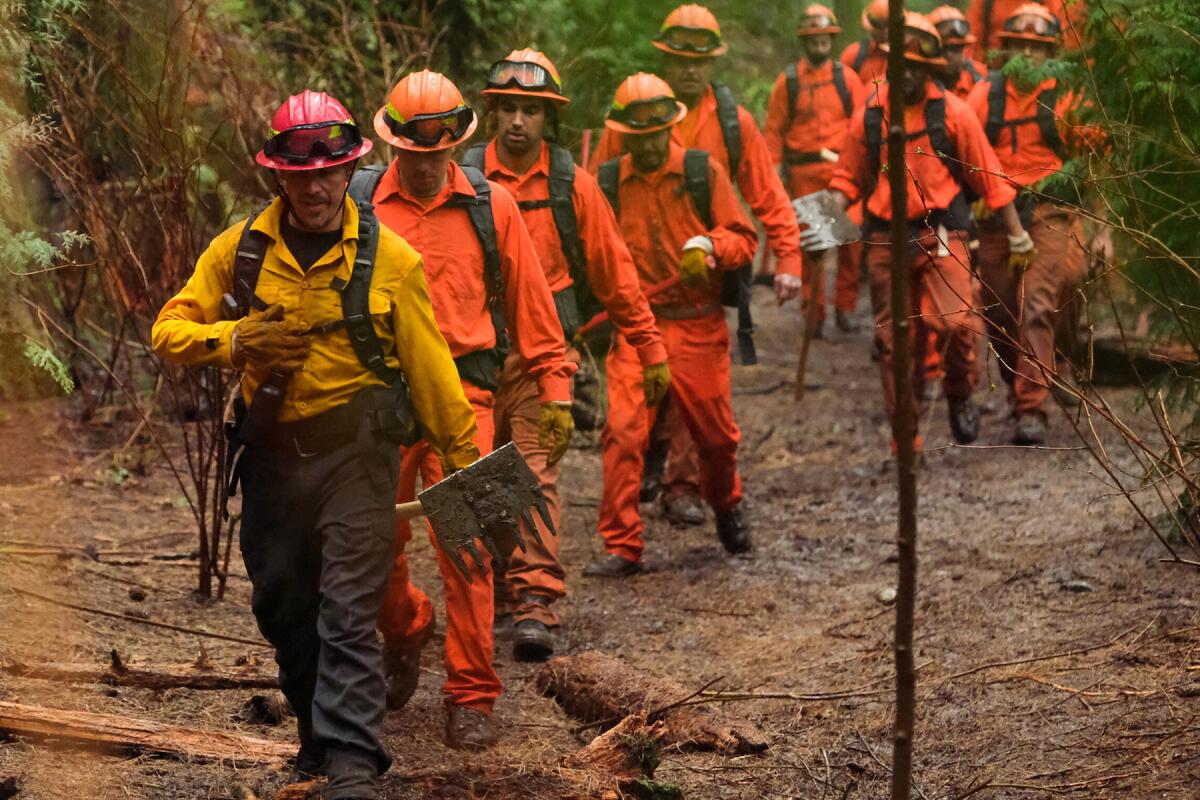
The actor Max Thieriot grew up in the quaint Sonoma County town of Occidental, a former logging hub nestled among towering redwoods with a current population of around 1,000.
The area is a bit of a getaway destination — Tom Waits and the Grateful Dead’s Mickey Hart are said to live nearby — and the type of place where you can order a glass of wine that was made walking distance away. (Thieriot, whose great-great-grandfather was M.H. de Young, the co-founder of the San Francisco Chronicle, co-owns an Occidental winery called Senses.) “I knew that this place that I live was not totally normal,” he recalled recently. Speaking of the dynamics of a small town like his, he said, “It’s kind of messy. Your drama is everybody’s drama.”
It was 7:30 p.m., and Thieriot was calling in from his “lunch break” on the Vancouver set of “Fire Country,” the CBS series he co-created and stars in and which takes place in Edgewater, a fictional town based on Occidental. “It’s a little bananas up here,” he said by way of apologizing for the weird hours. The show had just received a full season order, and things were in full action-program swing, as they often are for Thieriot, who does double duty for CBS by also starring as a Navy SEAL in “SEAL Team.”
On “Fire Country,” Thieriot, 34, plays Bode Donovan, an inmate serving time for armed robbery who volunteers for California’s Conservation Camp Program, in which prisoners are moved to minimum security camps in order to assist the California Department of Forestry and Fire Protection, known as Cal Fire. The firefighting gig would be a good fit for Bode (pronounced “Bo-dee”), who’s built like a Terminator but talks like a surfer, were it not for the fact that the character is ultimately stationed in Edgewater, where his former drama is still very much everybody’s drama. (“I’m from here,” Bode says gruffly in the pilot. “I left for a reason.”) Produced by Jerry Bruckheimer and co-created by “Grey’s Anatomy” vets Tony Phelan and Joan Rater, “Fire Country” is sort of like “Dante’s Peak” meets “Everwood.”
With a rural setting and the inspiration of Cal Fire’s inmate firefighter program, ‘Fire Country’ sets itself apart — sort of — from the competition.
“Fire Country” is the top new program on prime-time TV, which means plenty of people seem to like it, but its fans do not include Cal Fire’s director, Joe Tyler. “This television series is a misrepresentation of the professional all-hazards fire department and resource protection agency that Cal Fire is,” Tyler wrote in an email to the department in May, just after the show’s initial trailer was released. Tim Edwards, the president of Cal Fire’s union, Local 2881, added on to Tyler’s message with a mass email of his own: “I want to emphasize that we were not involved in the creation or production of the show, and we do not endorse the series,” he wrote in that email. “We have spoken with our legal team, and we cannot prevent the series from airing or using the Cal Fire name.”
The show has arrived at a particularly fraught point for Cal Fire and its fire-camp program. California, in addition to a handful of other states, has long utilized inmate firefighters; the program’s origins go back to World War II, when the supply of firefighters needed boosting. Fire camps have continued since that time as a vital arm for fire departments, pulling from a pool of inmates who meet certain criteria to assist with tasks like cutting containment lines. It’s dangerous work, and inmate firefighters are four times as likely to be injured as non-inmate firefighters.
But as issues such as climate change have accelerated the frequency and severity of wildfires, Cal Fire’s resources have been pushed to the limit. At the same time, the fire-camp program has downsized in recent years, largely due to what Edwards, the union president, describes as the result of a shift in policy that has decreased the number of low-risk inmates who are typically strong candidates for a fire-camp role. Along with the early release of many nonviolent inmates due to COVID-19 precautions since the outset of the pandemic, you have what Edwards cites as a roughly 75% reduction in inmate hand crews in the last eight years.
“When all these laws were implemented, not even sending these low-level inmates to jail, you start to get people that were multiple offenders with violent crimes into these [fire] camps,” Edwards said in a phone interview. “That’s a risk not just to my members and the captains, but to the general public.”
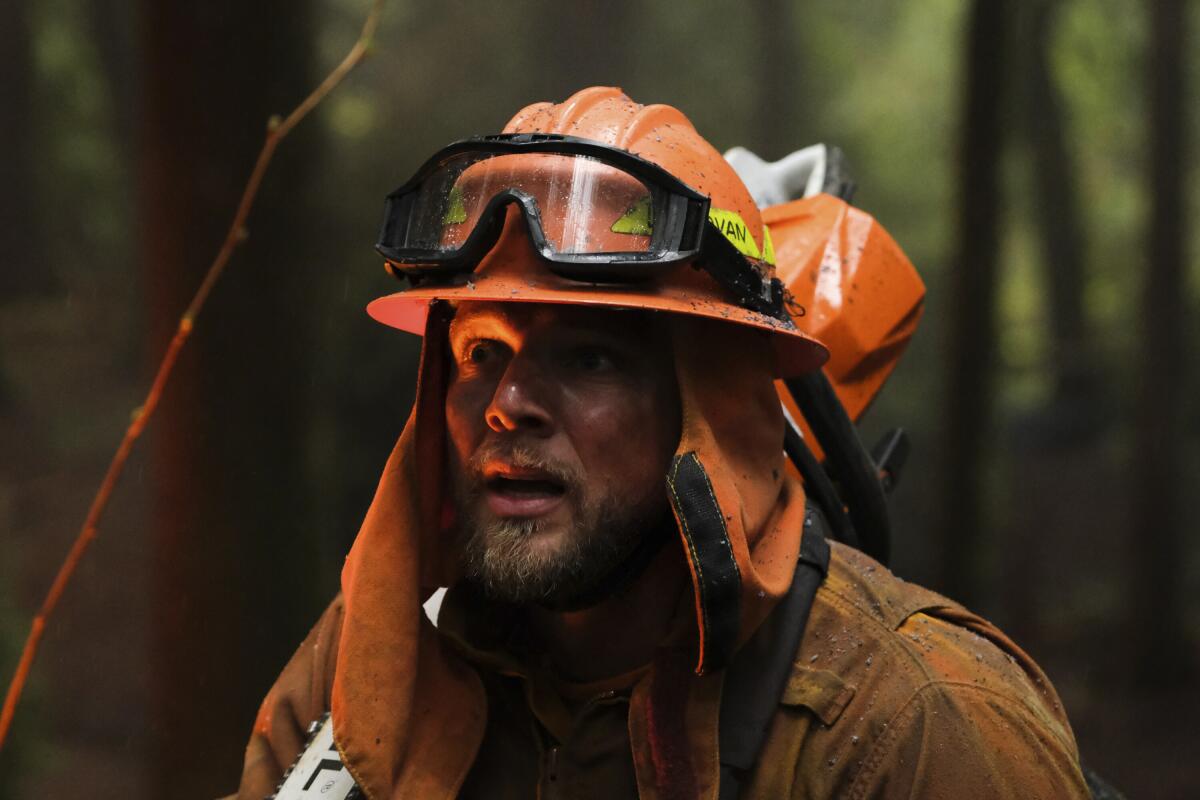
Inmates in the fire-camp program are paid less than minimum wage — just a few dollars a day and a few additional dollars an hour when actively on a fire line — sparking sustained criticism of the practice. There are conversations about paying the inmates more, but Edwards would rather that money go toward hiring non-inmate firefighters, and would like to have the fire-camp program abolished altogether.
“The legislators want to pay them as firefighters while they’re in the camps,” Edwards said. “So if you’re gonna pay someone that’s in jail, why not pay someone that’s actually worked their whole life and went to school to become a firefighter?” (Through a representative, Cal Fire had no further comment for this article beyond Tyler’s initial statement.)
Thieriot admitted that Cal Fire’s stern response to “Fire Country” initially “stung.” “I think I was more surprised by how quickly they [weighed in] without having seen anything,” he said, “and how the opinion came very fast off of a trailer that’s cut together to bring in an audience.” He also doesn’t see why the fire-camp program should be phased out: “Any time that we can try to rehabilitate people, and give them a real opportunity and second chance, then that’s a good thing,” he said.
Asked about Cal Fire’s stance, Tia Napolitano, the showrunner of “Fire Country,” said, “I had almost no response. I know we are making an entertainment show. It’s not a documentary. We do our absolute best.”
The Forestry and Fire Recruitment Program has been helping former inmate firefighters get jobs. It created a private fire crew to battle wildfires.
Napolitano pointed to the work of multiple consultants brought in by the production, both for the writers’ room and on set, to help depict firefighters accurately. One of those consultants, Jeff Snider, a recently retired firefighter with multiple decades of experience, explained that it’s a push-and-pull dynamic.
“If we see something and we go, ‘OK, we would never put our boots that way,’ for example,” Snider said, “They go, ‘OK, great, hang on. Let’s change all those boots. Let’s make sure this looks right.’” But sometimes, he said, the consultants’ suggestions just don’t work with the reality of how a prime-time drama gets made: “We’re really learning more every day about how they create good, quality TV, and we’re trying to teach them a little bit more about the fire service.”
Since first commenting on the show based solely on the trailer, Edwards has watched a full episode, and the nature of his criticism hasn’t changed. He’s more sure than ever that he doesn’t approve of the way “Fire Country” depicts Cal Fire and the fire-camp program: “If an inmate had a phone in a camp,” he said, referencing a plotline in the pilot, “without a doubt that inmate would be returned to general [prison] population. If an inmate left the camp, that inmate would never be back at the camp again. So what do they do? They have this guy going off base helping people and they’re just like, ‘Oh, no big deal. Don’t do it again.’”
Snider, the consultant, thinks the reason Cal Fire spoke up about “Fire Country” — even though it’s not typical to find, say, the New York Police Department commenting on the realism of “Law and Order” — is because “just in general with firefighters, we are very good at finding the flaw with each other,” he said. “I was jokingly saying, ‘If you take five random firefighters and put them in front of a fire service training video, they’ll tear it apart.’ Like, they’re gonna find where the glove wasn’t quite right, that guy shouldn’t be standing there, that helmet’s twisted partway — we are pretty ruthless.”
“The idea for this show was only with good intent,” said Thieriot, who speaks with unbridled admiration for the work of Cal Fire firefighters. “It’s an intense job and a heroic one,” he said. Then “lunch” was over, and one fire was put out for the day. He had to go back to set and put out a new one.
Watch L.A. Times Today at 7 p.m. on Spectrum News 1 on Channel 1 or live stream on the Spectrum News App. Palos Verdes Peninsula and Orange County viewers can watch on Cox Systems on channel 99.
‘Fire Country’
Where: CBS
When: Friday, 9 p.m.
Rating: TV-14 (may be unsuitable for children under the age of 14)
More to Read
The complete guide to home viewing
Get Screen Gab for everything about the TV shows and streaming movies everyone’s talking about.
You may occasionally receive promotional content from the Los Angeles Times.
